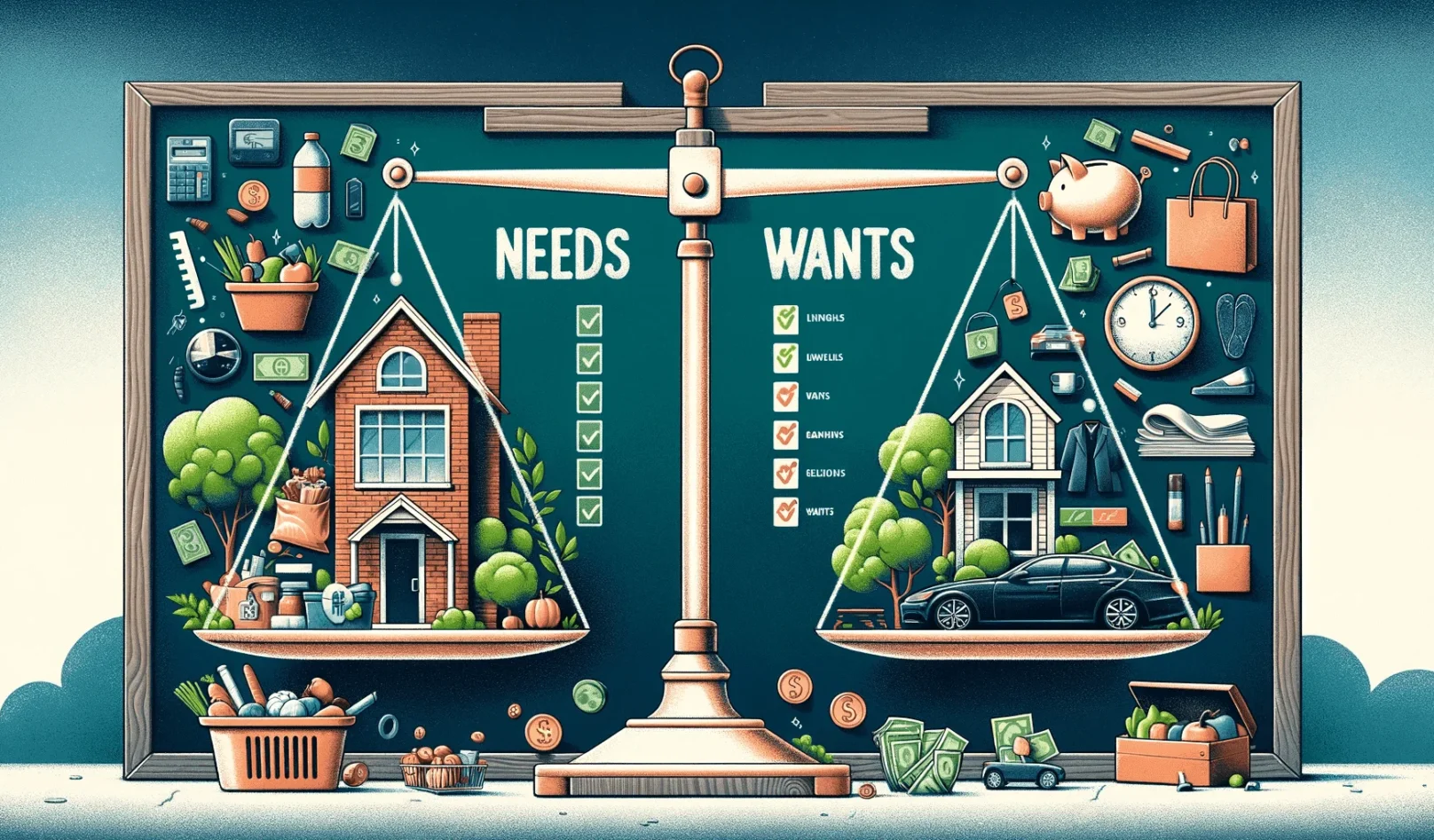
Understanding the Fundamental Difference Between Needs and Wants
The Difference between a need and want is a core component of financial literacy and responsible money management. This guide examines the psychology behind needs and wants, strategies for prioritizing essential needs in budgets, managing wants wisely, balancing both in financial choices, teaching concepts for improved money skills, and more.
Introduction to Needs and Wants
Defining needs and wants enables effective budgeting and smart financial decisions.
Needs are essential expenses for basic survival and wellbeing like food, shelter, utilities, healthcare, and insurance.
Wants are non-essential goods and services that provide enjoyment like vacations, hobbies, and luxury items. Differentiating the two is crucial for financial stability.
The Psychology Behind Needs and Wants

Our perceptions of needs and wants are shaped by psychological drives for safety/security versus pleasure/reward. Social pressures also influence spending choices. Distinguishing impulse wants from actual needs requires self-awareness and resisting external messaging.
Characteristics of Needs
Defining ‘Needs’: Essentials for Survival and Well-being
Needs include core expenses like:
- Housing costs
- Groceries and utilities
- Healthcare and insurance
- Reliable transportation
- Clothing
- Minimum loan/debt repayments
Satisfying basic needs enables functioning and financial stability.
Prioritizing Needs in Your Budget
Build your budget to cover all essential needs first before discretionary spending. Rank needs by importance if unable to cover all. Try limiting spending in lower priority categories temporarily to meet top priority needs. With time, increase income to expand coverage.
Useful Information: What Is The Difference Between Gross And Net Pay
Understanding Wants
Identifying ‘Wants’: The Role of Desire and Luxury
Wants entail goods and services like:
- Dining out
- Entertainment and recreation
- Electronics
- Memberships/subscriptions
- Travel and hobbies
- Designer goods
Wants satisfy desires but are not mandatory for day-to-day living.
Managing Wants: A Balanced Approach
Carefully manage wants spending to avoid debt or neglecting savings. Build modest wants spending into your budget using recommended limits like the 50/30/20 rule: 50% needs, 30% wants, 20% savings/debt. Enjoy wants responsibly by taking advantage of discounts, limiting spontaneous purchases, and researching big-ticket items diligently.
The Interplay of Needs and Wants in Financial Decision-Making

Needs vs. Wants: Making Informed Financial Choices
When faced with spending decisions:
- Prioritize needs first
- Weigh affordability of wants and how they fit into your budget/goals
- Beware rationalizing wants as needs
- Consider opportunity costs of discretionary expenditures
- Establish decision criteria based on financial objectives
With practice, distinguishing needs from wants becomes easier.
Practical Application in Budgeting
Creating a Budget that Balances Needs and Wants
- Build essential needs spending first: housing, food, utilities, transportation, insurance, minimum debt payments
- Allocate percentage of income to wants using recommended limits
- Within wants, rank priorities for allocating funds
- Adapt over time as income and expenses evolve
Apps help track spending across needs and wants.
Adjusting Your Budget for Life Changes
Major life events can shift the balance of needs and wants. Having a child increases needs for expenses like childcare and education. Career changes may necessitate wardrobe upgrades. Review budgets regularly and adjust priorities as circumstances require.
Needs and Wants in Business and Economics

In business, evaluating consumer needs versus wants informs profitable product development. Economists study societal needs versus wants. Policymakers try balancing funding essential needs versus constituency wants. Understanding human motivations behind needs and wants provides insights across fields.
Needs and Wants in the Context of Loans
Ideally, loans should address basic needs like housing, transportation, and education. Using loans or credit for wants rather than true needs can lead to unmanageable debt. Evaluate necessity carefully when considering loans.
Psychological and Societal Influences
Family expectations, social pressure, traditional gender roles, and cultural values influence perceptions of needs and wants. Marketing and social media also fuel unrealistic desire for wants. Becoming a mindful, critical consumer provides clarity.
Teaching Needs and Wants
School curriculum and parental lessons should cover distinguishing needs and wants from childhood through adolescence. Resources like games, worksheets, and hands-on experience like budgeting household expenses make concepts tangible.
Conclusion: Mastering the Balance
Determining needs from wants is an ongoing journey. But commitment to financial literacy and mindful spending brings clarity. With practice, you can master balance between necessities and indulgences to achieve financial freedom.
FAQs:
What is a simple way to differentiate between a need and a want?
Ask yourself: “Could I survive or maintain my current lifestyle without this?” If yes, it’s a want. If no, it is likely a need.
How can I adjust my budget when my needs and wants change?
Continually re-evaluate your needs and wants, and be ready to adapt budget percentages accordingly. Build in flexibility to reallocate funds.
Can loans be justified for both needs and wants?
It is wise to only take loans for essential needs and avoid debt for discretionary wants. However, some wants like education may merit loans within affordable limits.
How do societal pressures influence our needs and wants?
Social media and peer comparisons fuel perceptions that luxuries are necessities. Stay grounded in your own values to determine actual needs versus desires.
Are there tools to help manage needs and wants in my budget?
Apps like Mint and You Need a Budget provide spending insights and customizable categories to track needs versus wants.
